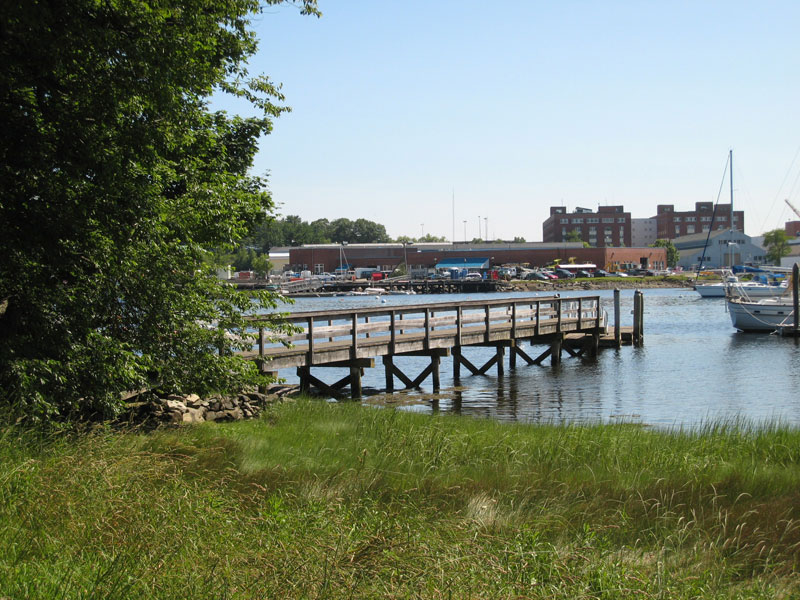Gundalow Company anticipates windfall from Kittery Point waterfront property sale
“Our twelve years in the Kittery house was a windfall for us, living on waterfront with a deep water dock – having bridge-free access to the open sea, taking what was an unkempt lot full of bramble and turning it into what we came to say is a ‘Maine-scaped’ acre with stately ledge and sloping lawn,” Sherry Walworth reminisced. “We think it’s a good turn around that we can take whatever windfall that comes from our house sale now and share it with the Gundalow Company.”
The property, currently on the market, is at 108 Whipple Road, Kittery Point. It is a 19th century 1,500 square feet house on one acre with three bedrooms, a small barn, ocean-access dock, and a solar hot water and electric system that has reduced electric utility costs by 75%.
Walworth is a former teacher and social worker, and her husband, Charlie Case spent over thirty years as a mechanical engineer. They raised two children in Concord, Massachusetts before they migrated north to settle in coastal southern Maine. “We’ve been extremely fortunate in that we’ve been coming to the region for many years, being boaters out of Pepperrell Cove in Kittery, Maine, long before we moved here. We vaguely knew of the gundalow as we saw it round about the Piscataqua, popping up unexpectedly here or there knowing little about it or who was behind it,” Walworth recalled.
Their first encounter with the gundalow The Captain Edward H. Adams was in 2007 while it was docked at Prescott Park for Fourth of July festivities. A lecture by Gundalow Company board member, Nate Hazen, at the Discover Portsmouth Center in 2009, however, was the tipping point. “Our fascination began that day. One might say a tide turned. We found out how this replica boat represents the many that filled Piscataqua waters in the past, carrying cargo and, at times, passengers, on what was called a packet. We were struck by how much this boat has a unique place in the story of boating and tidal energy and how the entire Great Bay with all its tributaries developed, for better or for worse,” Case recounted.
“Sherry and Charlie’s most generous gesture is an inspiration to us all,” remarked Molly Bolster, Gundalow Company Executive Director. “By choosing to show their passion for our mission in this unique way, Sherry and Charlie are helping raise awareness of local water quality issues and our shared responsibility to protect the Piscataqua watershed.”
For more information 108 Whipple Road, Kittery, Maine, or contact Pam Gray at 603.431.1111 x 3821.
More about the house:
“We have learned how interrelated water and land is, how communities must build on that learning in connected ways, like what is evidenced by Gundalow Company partnerships with several related organizations. This includes working with harbor-masters, lobstermen, boat clubs, etc. In Kittery, groups such as the Spruce Creek Association have stepped forward to help homeowners know the ins and outs of economical often simple care and maintenance for shore land so fabulous. As to the house, what was best for us, and maybe this includes the barn too, is that it is a strong and unassuming structure with significant history. We know the house was not the original one but there certainly was an earlier dwelling that was built by Kittery settlers. This we know from the book Old Kittery and her Families. One can still see very old beams in the cellar. Lastly, it’s clear that boats were pulled up along the coast at this shore front. An old block sits squarely at the water’s edge where a winch once perched, ready to haul in boats along what are now long unused ways. The boat building in these parts and livelihoods counted on from seafaring men must have been grand!
One last thing about our house and learning– Just as the sustainability movement in the seacoast area gained momentum we were realizing that we could carve a retirement lifestyle that had real meaning in our community. When we became exposed to energy saving ideas that suited our house we decided to install solar panels to help with electric and hot water bills, not to mention join the effort to reduce the earth’s carbon foot print. It turns out that the position of the house is perfect for a roof solar installation, not impacting the interior with tucked away but easy to get at pipes. What we came to learn is that this system is no different than a typical homeowner heating set up that one must learn to service and take care of as ordinary home ownership. For us and tenants who reside in the home the operation is seamless with huge benefits. Expanding the building is easy, too, even adding more solar panels if wanted.”




